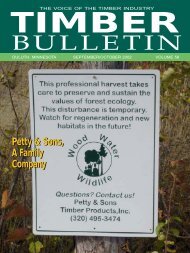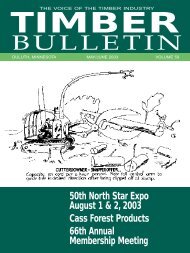Timber Bulletin Nov/Dec - Minnesota Forest Industries
Timber Bulletin Nov/Dec - Minnesota Forest Industries
Timber Bulletin Nov/Dec - Minnesota Forest Industries
- No tags were found...
You also want an ePaper? Increase the reach of your titles
YUMPU automatically turns print PDFs into web optimized ePapers that Google loves.
TPA Blasts ChippewaNational <strong>Forest</strong>As I sit down to write thiscolumn our early <strong>Dec</strong>emberweather looks more like lateOctober – being 50 degreesyesterday and raining today. I’msure we are all ready for coldweather to set in so we can getstarted on our winter sales.The TPA Executive Board hashad several meetings recently.Some of the issues discussedinclude the timber harvestingPresident’sColumnguidelineswhich arebeingreviewedthis yearand theproposed DNRtimber salecontract. Bothsubjects are veryimportant to ourmembersbecause we areaffected by them each day on thejob. We are also busy selectingcandidates to be interviewed forour field representative from themany applications we havereceived recently.With the market conditionssomewhat questionable, I’mhoping everyone has aproductive winter – andremember to log safely.The <strong>Minnesota</strong> <strong>Timber</strong> ProducersAssociation (TPA) today blasted thegovernment’s management of theChippewa National <strong>Forest</strong>. TPAlabeled the U.S. <strong>Forest</strong> Service’smanagement oversight of theChippewa as “insensitive to thelong-term economic hardship itwas forcing on the logging familiesof northern <strong>Minnesota</strong>.”Focus of the TPA anger iscontained in the public records thatindicate that the <strong>Forest</strong> Service hasdrastically diminished the amountof timber being allowed for publicsale in the Chippewa by more than60 percent in just the past threeyears.TPA Executive Vice PresidentWayne Brandt accused thegovernment of “filling the role ofthe <strong>Forest</strong> Grinch in delivering to<strong>Minnesota</strong>’s logging families aholiday of uncertainty andunhappiness as a direct result ofthe agency’s willingness to followpolicies that are hurting theeconomy of northern <strong>Minnesota</strong>.This policy of strangling theamount of timber allowed forharvest has forced unjustifiableeconomic burdens on the backs ofnorthern <strong>Minnesota</strong> loggingfamilies who depend on a reliableand predictable supply of timberfrom the Chippewa National<strong>Forest</strong>.”Brandt said that the <strong>Forest</strong>Service’s continued adherence tothis wrong-headed policy ofharvest reduction is harmful to allsegments of the state’s now-fragileeconomy. “Anybody with anysense,” Brandt said, "can see thekind of recession this state and ourentire country is in right now. Ourstate is facing a deficit of almost $2billion dollars. As more and moreloggers make less and less moneybecause of fewer and fewer treesbeing set for harvest, the taxreceipts of our state, our cities, ourcounties and our towns andvillages is only going to becomemore dire.“The same is true for the federalgovernment,” Brandt said. “Thegovernment treasury that pays thesalaries of the <strong>Forest</strong> Serviceemployees is being strangled intodeficit, in part as a result of lostrevenues that normally would flowto the government from the sales oftimber within the national forests,”said Brandt.The TPA’s anger boiled over inthe wake of the decision by theBlackduck Ranger District of theChippewa National <strong>Forest</strong> tosupport a policy that will now offer75 percent less timber volume thanthe district’s original proposalearlier this year.“The Winnie North VegetationEnvironmental Assessment originalproposal called for significantlyhigher timber harvesting volumes.Now, those essential harvestvolumes are being cut dramaticallyas a result of the highlyquestionableand enormouslysuspect policy reversal by theBlackduck District,” Brandt said.The revised Winnie North EA isproposing to conduct shelterwoodharvests in old age (70-year-old)aspen stands. Shelterwoodharvests are designed for treespecies that are shade tolerant andregenerate by seeding themselves.Aspen is a shade intolerant specieswhich requires direct sunlight tonaturally regenerate itself.The loggers organizationestimates that by abandoning itsprevious position and resorting tothe new proposal of untenableharvesting reductions, the <strong>Forest</strong>Service in the Blackduck Districtwill be directly responsible for theloss of 71 jobs and almost $5million in lost revenues andeconomic activity in the region.The TPA is asking members of<strong>Minnesota</strong>’s congressionaldelegation to pay particularattention to the fact that this vastlyreduced timber allocation from theChippewa will result in a loss tothe federal government of almost aquarter of a million dollars.“Not only is this the wrongmanagement approach for the localeconomy, it jeopardizes the veryforest stands to be managed. If theChippewa goes forward with thisapproach for managing aspen, TPAsees a future of brush and notforest for these areas,” concludedBrandt.4 <strong>Timber</strong> <strong>Bulletin</strong> <strong>Nov</strong>ember/<strong>Dec</strong>ember 2001
















